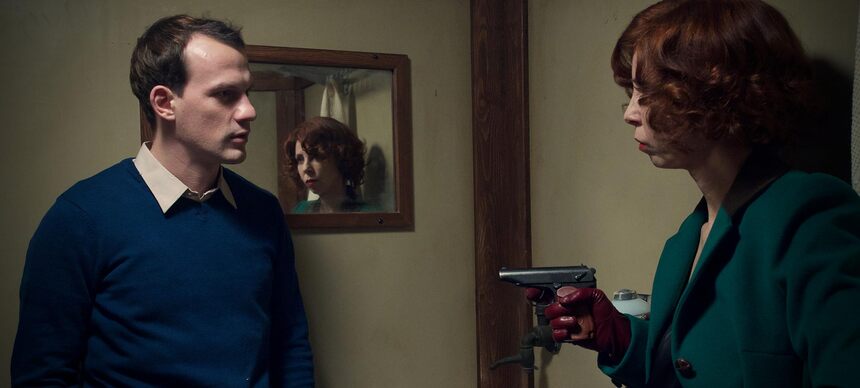Fantaspoa 2024 Review: MASTERGAME (Mesterjátszma), Visually Compelling Thriller with Chess, Trains and Bathroom Fights

It’s November 1956, and Russian tanks have just invaded Budapest, crushing the revolution.
A young couple, István (Gergely Váradi) and Márta (Varga-Járó Sára), rushes for the last train that can get them out of the country. When aboard, they are approached by a mysterious fedora-wearing man (Pál Mácsai), who encourages Márta, a talented chess player carrying a set, to play against him.
In another, parallel storyline, a priest (Károly Hajduk) is captured and imprisoned by the secret police. As they subject him to psychological torments in hopes he will give up the location of an unknown Vatican treasure, he finds salvation in vigorously studying a chess textbook. These two stories, tied by chess and people who desperately strive for freedom, will inevitably cross aboard the night train.
Directed by Hungarian filmmaker Barnabás Tóth, who has been on the “to keep an eye on” list ever since his delightful shorts My Guide (2013) and Susotázs (2018), Mastergame has already started its pretty fruitful festival run and is now showing at the Fantaspoa International Fantastic Film Festival. This is a film that is not what it initially seems to be, in all the best ways. Loosely based on Stefan Zweig’s The Royal Game, Tóth’s feature starts off as an honest period piece, even though the cool opening shot, cleverly turning the world upside down, suggests that more genres might be in play.
The film then unfolds as a spy thriller that’s reminiscent of many great things, from Alfred Hitchcock (a big lover of trains himself) and noir films to various classic outings of Eastern European cinema, such as Jerzy Kawalerowicz’s Night Train (1959), István Szabó’s Budapest Tales (1976) and Nimród Antal’s Kontroll (2003). Despite the multiple timeline structure (and chess combinations), Mastergame is concise and compact, as its runtime comes up to a blessed 90 minutes.
As far as hermetic thrillers go, Tóth has a great central location and isn’t afraid to use it, coming up with creative ways to show the train piercing through the darkness and using its containment as an advantage. Towards the end, it also makes for a fun action sequence that is unexpectedly humorous and involves a face lick.
Actually, despite the historical setting and heavy topics, Mastergame is just generally enormously entertaining. Its ideas might not be groundbreaking and its twists – of which there are several – are somewhat foreseeable, but that doesn’t make them any less satisfying.
The film’s strength is in its rhythm, suspense and cool aesthetics, which ultimately translate into, not only a competent psychothriller, but also a compelling love story. And, regarding that bathroom fight scene: honestly, had I known that a good face lick could be instrumental in getting the upper hand in a confrontation earlier in life – what a brave new world that would be.
The film screens at Fantaspoa again on April 20.







